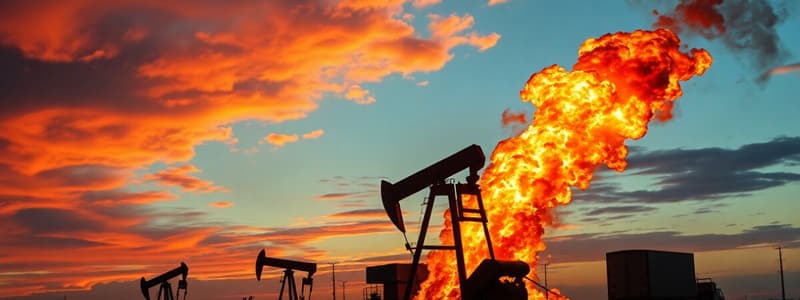Podcast
Questions and Answers
The article suggests that measurements of economic, energy, military, and class aspects contribute to the ongoing use of fossil fuels.
The article suggests that measurements of economic, energy, military, and class aspects contribute to the ongoing use of fossil fuels.
True (A)
This research was funded by the 'Programa de becas para el apoyo general de estudiantes y/o egresadas(os) de la UNAM'.
This research was funded by the 'Programa de becas para el apoyo general de estudiantes y/o egresadas(os) de la UNAM'.
False (B)
The United Nations Framework Convention on Climate Change was established in 1995.
The United Nations Framework Convention on Climate Change was established in 1995.
False (B)
The author is a specialist in Latin American history and a master in sociopolitical studies.
The author is a specialist in Latin American history and a master in sociopolitical studies.
Since 1990, approximately 50% of all historical fossil fuels have been burned.
Since 1990, approximately 50% of all historical fossil fuels have been burned.
The study suggests that two key groups driving capitalistic destruction are the military-industrial-renewable complex and fossil fuels businesses.
The study suggests that two key groups driving capitalistic destruction are the military-industrial-renewable complex and fossil fuels businesses.
In May 2019, the atmospheric carbon dioxide concentration reached 425 parts per million.
In May 2019, the atmospheric carbon dioxide concentration reached 425 parts per million.
The research was conducted within the 'Centro de Estudios Latinoamericanos' at the Faculty of Political and Social Sciences of UNAM.
The research was conducted within the 'Centro de Estudios Latinoamericanos' at the Faculty of Political and Social Sciences of UNAM.
James Hansen, in 1988, told the US Senate that there was a 100% certainty that climate change was caused by humans.
James Hansen, in 1988, told the US Senate that there was a 100% certainty that climate change was caused by humans.
The majority of fossil fuels have been burned since the year 1950.
The majority of fossil fuels have been burned since the year 1950.
Technological regimes disappear entirely when a new one develops, making old technologies obsolete.
Technological regimes disappear entirely when a new one develops, making old technologies obsolete.
Capitalism fosters equality in the distribution of production and reproduction means, ensuring a level playing field for all groups.
Capitalism fosters equality in the distribution of production and reproduction means, ensuring a level playing field for all groups.
Social classes that amass economic and political influence have limited access to leading positions in key institutions.
Social classes that amass economic and political influence have limited access to leading positions in key institutions.
The equal distribution of power and wealth results in an uniform responsibility for the genesis of social problems, including climate change.
The equal distribution of power and wealth results in an uniform responsibility for the genesis of social problems, including climate change.
The current climate crisis is a result of the actions of everyone, since everyone has the same ability to influence the economic system.
The current climate crisis is a result of the actions of everyone, since everyone has the same ability to influence the economic system.
Flashcards
Military-Industrial-Fossil Complex
Military-Industrial-Fossil Complex
The combined power of the military, industrial, and fossil fuel sectors driving the continued use of fossil fuels for profit.
Fossil Fuel Elites
Fossil Fuel Elites
Wealthy individuals and groups who benefit from the exploitation of fossil fuels and resist change towards sustainable energy.
Accumulated Destruction
Accumulated Destruction
The ongoing destruction of the environment through relentless fossil fuel consumption for economic gain.
Factors Driving Fossil Fuel Consumption
Factors Driving Fossil Fuel Consumption
Signup and view all the flashcards
Responsibility for Environmental Damage
Responsibility for Environmental Damage
Signup and view all the flashcards
Greenhouse Effect
Greenhouse Effect
Signup and view all the flashcards
Global Warming
Global Warming
Signup and view all the flashcards
Climate Change
Climate Change
Signup and view all the flashcards
Fossil Fuels
Fossil Fuels
Signup and view all the flashcards
Greenhouse Gases
Greenhouse Gases
Signup and view all the flashcards
Overlapping Technological Regimes
Overlapping Technological Regimes
Signup and view all the flashcards
Capitalism and Inequality
Capitalism and Inequality
Signup and view all the flashcards
Dominant Groups in Capitalism
Dominant Groups in Capitalism
Signup and view all the flashcards
Unequal Responsibility for Societal Issues
Unequal Responsibility for Societal Issues
Signup and view all the flashcards
Class Origins of Ecological Collapse
Class Origins of Ecological Collapse
Signup and view all the flashcards
Study Notes
Fossil Capitalism in the 21st Century
- The article examines the structural mechanisms sustaining fossil fuel burning and greenhouse gas emissions despite their devastating effects on the climate, biosphere, and humanity.
- Studies of fossil capitalism by Altvater, Angus, and Malm are used to highlight the capitalist and class nature of the current environmental crisis.
- The root of the problem is not overpopulation but the activities favoring fossil fuel elites.
- The article uses economic, energetic, military, and class indicators to illustrate the ongoing fossil fuel burning in the 21st century.
- Two main categories are analyzed: the military-industrial-fossil complex and fossil elites, both influenced by C. Wright Mills's work.
- The continuous consumption of fossil fuels could trigger planet-wide collapse.
Fossil Fuel Crisis
- The article emphasizes the ongoing environmental crisis despite international conferences and negotiations.
- Fossil fuel use is devastating the climate, biosphere, and humanity.
- Current efforts to address the crisis are not enough.
- The root of the problem is not population growth but the activities of the fossil fuel elites.
Economic, Energetic, Military, and Political Mechanisms
- Fossil capitalism is a social, economic, and political system prioritizing fossil fuel accumulation via the exploitation of labor and biophysical resources.
- This system maintains inherent power imbalances and perpetuates the use of fossil fuels.
- International corporations, banks, and the military complex are central to this system.
- Mechanisms for upholding this status include control over fossil fuel sources, infrastructure, pricing, and demand.
- Fossil fuel usage has been on an accelerated increase since the 1990s.
- The military-industrial complex extensively utilizes fossil fuels.
- The article argues that the current economic system is dependent on fossil fuels for growth.
- Even technological advancements increase, not decrease, overall fossil fuel consumption.
- The EROEI (Energy Return on Energy Invested) is decreasing for fossil fuels, creating economic and political pressures.
Elites and the Crisis
- Fossil fuel elites prioritize profit over environmental concerns and use their resources to resist meaningful change.
- They are shielded from the consequences of their actions by their social and economic protections.
- Strategies and policies supporting the continuation of fossil fuel use are employed.
- The elites may use extreme measures to maintain their control and continue exploiting resources.
- This includes lobbying, opposing regulations, and supporting policies that reinforce the reliance on fossil fuels.
Studying That Suits You
Use AI to generate personalized quizzes and flashcards to suit your learning preferences.




